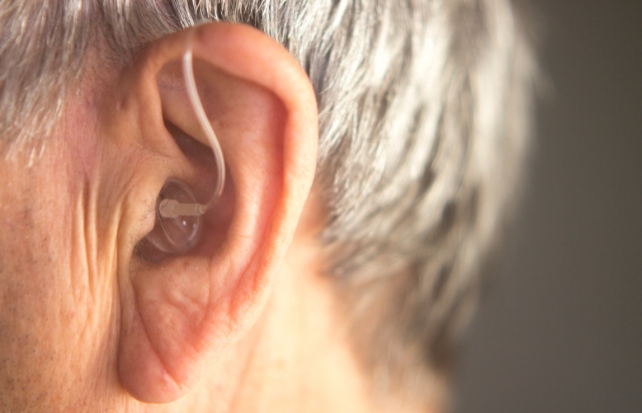Listening to is a ability most of us take with no consideration. However analysis means that adults ought to hear out for modifications of their listening to, as listening to difficulties is likely to be linked to creating dementia at an older age.
In a 2021 research of over 80,000 adults over the age of 60, those that had hassle listening to speech in noisy environments had a larger danger of dementia, which is an umbrella time period for circumstances characterised by reminiscence loss and issue with language and different considering expertise.
However there’s an upside, too: The research added to proof suggesting listening to issues could not simply be a symptom of dementia however really a danger issue of dementia that would presumably alert individuals, their households, or docs to its onset earlier than any deterioration begins.
“There has been a particular interest in hearing impairment and whether that can increase the risk of dementia,” mentioned epidemiologist and research creator Thomas Littlejohns of the College of Oxford in July 2021.
“While preliminary, these outcomes recommend speech-in-noise listening to impairment may symbolize a promising goal for dementia prevention.”
In 2017, listening to loss was listed together with smoking and bodily inactivity as one in all 9 main, modifiable danger components of dementia. That landmark Lancet report was quickly up to date in 2020 to incorporate three extra danger components, taking the whole to 12. In 2024, a 3rd replace of the Lancet report added one other two, for a brand new complete of 14 modifiable danger components.
The key phrase there may be modifiable: These danger components are components of our life-style and basic well being that may be improved, and in that case, could enhance our total well being and scale back the percentages of well being circumstances.
It has been estimated, in these Lancet studies, that of these dementia danger components, listening to loss might need the best burden of all – such that folks with unaddressed listening to loss in midlife are as much as 5 instances extra more likely to develop dementia.
To research this, the College of Oxford researchers behind this research tapped into the UK Biobank, a analysis database set as much as tease out the hyperlinks between genetics, environmental components, and well being outcomes throughout a big chunk of the UK inhabitants.
Dementia danger was analyzed for a bunch of greater than 82,000 men and women, aged 60 years or older, who have been free from dementia and had had their listening to assessed firstly of the research.
The contributors have been examined on their speech-in-noise listening to, which is the power to pick snippets of speech in a loud setting – on this case, recognizing spoken numbers in opposition to white background noise.
After 11 years or so, 1,285 contributors had developed dementia, primarily based on well being information.
“Participants who had worse hearing had almost double the risk of developing dementia compared to those who had good hearing,” mentioned Littlejohns.
Curiously, about half the individuals within the research who had inadequate speech-in-noise listening to, and roughly 42 % of those that carried out poorly on the check, did not discover any listening to impairment themselves when requested to report it.
The researchers additionally thought-about whether or not individuals’s listening to impairments have been really tied to different components recognized to affect dementia danger, resembling social isolation and melancholy, each of which could eventuate if individuals have hassle listening to.
“But we found little evidence that this was the case,” mentioned Littlejohns.
Simply to make sure, Littlejohns and his colleagues additionally made some comparisons within the knowledge to see whether or not or not individuals’s listening to efficiency could have really been impacted by underlying, undetected dementia – what’s known as reverse causation.
However the danger of dementia indicated by listening to difficulties was no worse evaluating research contributors who developed dementia sooner (after 3 years) fairly than later (after 9 years); it remained about the identical.

This wasn’t the primary research to discover a hyperlink between listening to loss and dementia, however the workforce mentioned it was among the many first to research dementia danger and other people’s listening to potential in noisy environments, that are extra typical of our on a regular basis.
Equally, prolonged and enormous research from Australia and Taiwan have additionally discovered people who find themselves exhausting of listening to have a larger danger of dementia. Nonetheless, these research relied on self-reported knowledge from research contributors, or on medical information denoting listening to loss.
“Large studies like the UK Biobank are powerful tools for identifying genetic, health, and lifestyle factors linked to conditions like dementia,” neuroscientist Katy Stubbs, from Alzheimer’s Analysis UK, a analysis charity, mentioned of the College of Oxford research. “But it is always difficult to tease apart cause and effect in this type of research.”
Keep in mind, the very best epidemiological research can do is locate associations between environmental components, well being, and illness, on a inhabitants degree.
“It’s important to bear in mind with this type of study design you can’t infer causality,” mentioned Littlejohns, “but this adds to the existing literature that hearing impairment could be a modifiable target to reduce the risk of developing dementia.”
Let’s not overlook both, this analysis advised that defending our ears in opposition to listening to harm, with earmuffs and earplugs, and serving to individuals hear higher with listening to aids, may doubtlessly assist mitigate this potential danger issue of dementia, which impacts thousands and thousands worldwide.
Too few individuals on this explicit research have been utilizing listening to aids to achieve any agency conclusions simply but and medical trials might be wanted earlier than we are able to say extra. However it’s an space of investigation that will provide hope in our understanding and prevention of dementia.
The research was revealed in Alzheimer’s & Dementia: The Journal of the Alzheimer’s Affiliation.
A model of this text was first revealed in July 2021.

